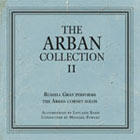 The Arban Collection II
The Arban Collection II
2-Nov-2008
Russell Gray ends his bible studies with the completion of the Arban solos. Are they the definitive recordings though?
Russell Gray
Accompanied by the Leyland Band
Conductor: Michael Fowles
Egon Recordings: CDSFZ145
Total Playing Time: 57.56
This is a frustrating release. What could have been one of the very best solo CDs of the year (or the last few years for that matter) never quite reaches the standard it deserves to be.
Russell Gray is an outstanding cornet soloist; Leyland a very fine band; Brian Hillson, arguably the best producer of brass recordings around; the arrangers quality craftsmen - yet on this occasion, what could and should have been a definitive recording of the definitive set of the most famous cornet solos in the world, never quite manages to rise above a level that is anything more than just very good.
Frustration
The frustration comes in knowing that all that was needed to be an absolute corker was a little bit more care and attention to detail.
Russell Gray’s playing is top class, but at times there is also poor tuning, scruffy phrases and imprecise production. For instance, it is so frustrating to hear meaningless final flourishes up to super F at the end of some of the pieces. It’s like hearing Ashkenazy playing the 24 Bach Prelude & Fugues and finishing the odd one in the style of Liberace. You can almost hear the sound of Jean Baptiste Arban turning in his grave.
Leyland meanwhile is a solid and sympathetic accompanist, but momentarily swamp the solo line, or just leave a clumsy impression where a bit more care was needed.
Meanwhile, Brian Hillson’s sound production is as near perfect as you come to expect, but sporadically the acoustic disparity between band and soloist makes the accompaniment sound as if it is coming from a different room. The arrangements too are enjoyable and colourful, but at times seems dislocated to such an extent that the introductions and linking passages have little in common with the musical subject matter.
Oversight
These are minor blemishes however in relation to the complete absence of sleeve notes about the pieces – an oversight that for such a project is not merely frustrating, but inexcusable.
Just copying out the preface report (the one found on page V of the Arban book) tells us nothing if there is no link to the ‘final observations’ given by the great man (page 192 if you ask) prior to the fourteen studies and eighteen solos that conclude his ‘Complete Method’ (the 'Bible' to brass players). It is also a facsimile of what is written and presented in the first release of this series too.
Raison d'être
The whole raison d'être of the Arban is as a complete methodology – an academic appraisal of the art of cornet playing. Arban himself provides his final observations as such: ‘In the eighteen solos, with which I terminate this work, will be found all the difficulties to which I have given the solutions…the result may be the acquisition of talent that will warrant his name worthy of being cited, and his performance quoted as an example for future imitation.”
Not when you have no idea what they are about, why they were written in the style they were, what chronological order they were written in, or even why Russell Gray chooses to play them in an order totally different from the way they are set out in the ‘Method’ itself. (the same on the first release too)
There is a reason – note the phrase, ‘…which I have given the solutions’ – why Arban has set them out the way he did (the last three solos are all Polkas for instance) - it would have been nice therefore if we knew what it was.
Decent research
In the first Arban collection Russell Gray touches on the subject, so why couldn’t some decent research have been done in time for the second, to complete the series with a written analysis the same standard of the playing on show. What is the ‘Souvenir’ de Kroll, or the ‘Favori’ theme?
It means that you are left impressed by the concept, rather deflated by the end product.
You can sit back and enjoy a fine soloist on top form, but one who has taken his eye off the need to ensure that all the elements of his ‘complete collection’ come up to the same standard of his performing contribution.
You sense that a man such as Arban, who set out his ‘Complete Method’ with such meticulous attention to detail, may have thought the same too.
Iwan Fox
What's on this CD?
1. Variations sur le Carneval de Venise, Arban arr. Marc Owen, 8.08
2. Souvenir de Kroll, Arban arr. John Durrant, 5.17
3. Vois tu la Neige qui Brille, Arban arr. Gary Westwood, 5.52
4. Cavatine et Variations, Arban arr. Gary Westwood, 6.53
5. Casino Polka, Arban arr. Gary Westwood, 2.11
6. Sur un Theme Favori (de Weber), Arban arr. Gary Westwood, 6.26
7. Air Varie sur le petit Suisse, Arban arr. Gary Westwood, 8.38
8. Premier Solo, Arban arr. Gary Westwood, 6.39
9. Bonheur de se Revoir, Arban arr. Iain McKnight, 6.59









